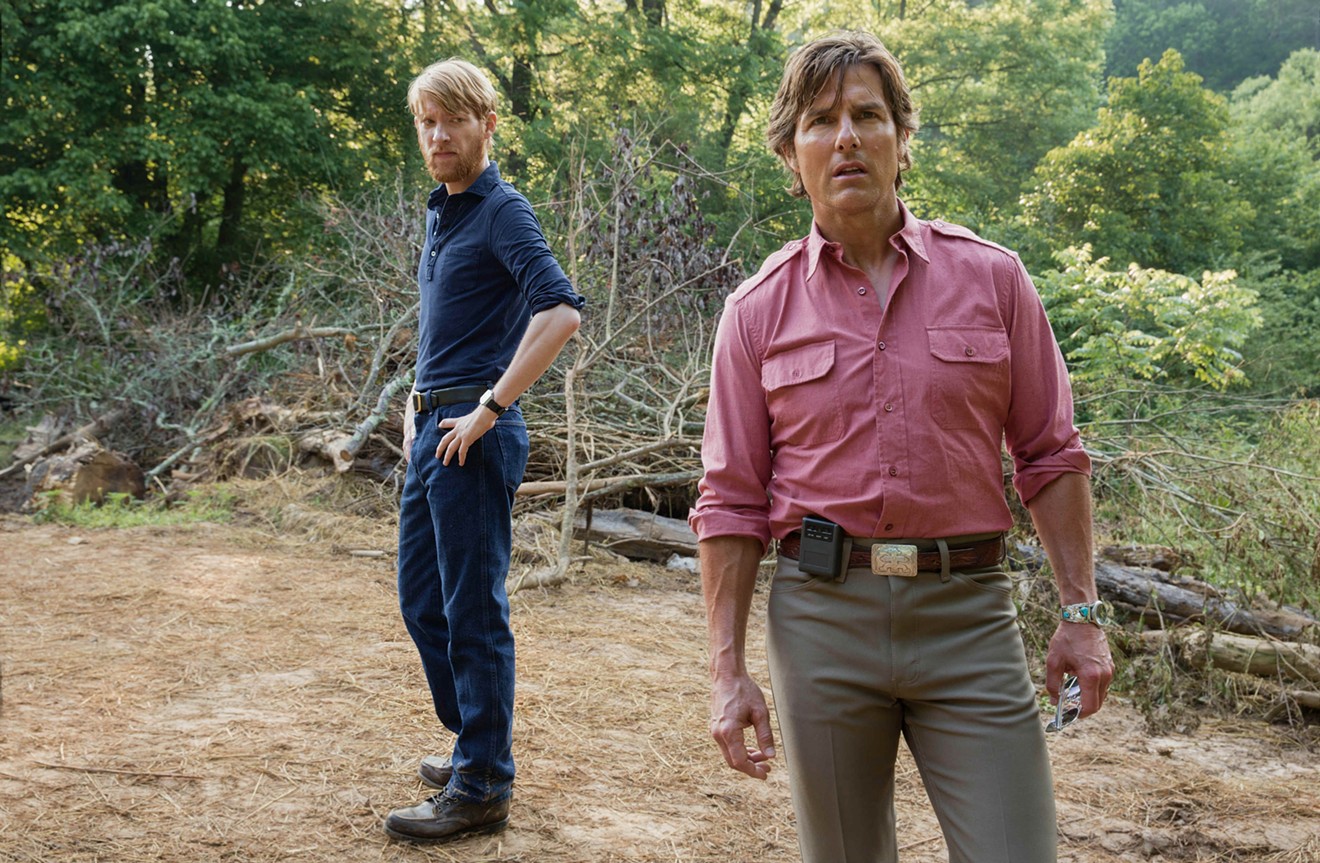Just a little more than three months ago, Tom Cruise starred in a lifeless wannabe-blockbuster called The Mummy that made little use of his innate charisma (shut up, he still has some) or his star persona, turning him into an anonymous action hero. Now comes American Made, a picture that seems unthinkable with anybody but Tom Cruise in the lead. The man who for much of the ’80s and ’90s was the biggest movie star in the world has done his share of good and bad work in the past decade or so, but American Made is his first effort in a long while that feels like an honest-to-god Tom Cruise movie; suddenly, his smile means something again. But there’s one huge, beautiful catch: Doug Liman’s electric film is clear-eyed about the cynicism and corruption beneath its hero's anxious grin. It voraciously breaks down both the star and the country he has symbolized for so much of his career.
Cruise plays Barry Seal, a workaday TWA pilot frustrated with the grind of hopping from city to city, flying planes on autopilot and coming home to crash asleep before his beautiful, devoted wife Lucy (Sarah Wright) can even put on her welcome-home lingerie. It’s the late ’70s, the era of oil shocks and social malaise. Barry has also been doing some minor smuggling on the side, transporting illegal Cuban cigars. Into his life pops “Schafer” (Domhnall Gleeson), a CIA operative eager to recruit our man’s aerial talents to fly covert missions into Latin American countries and take spy photos of resistance movements. They outfit him with a sweet twin engine super-plane (“She looks like she’s going 300 miles an hour just sitting there!”), his own front company and lots of money. Barry can’t stop giggling in disbelieving delight.
Thus begins an insane journey in which Barry (who was a real person, by the way, though parts of this story have been Hollywoodized) spends years hopscotching the international underworld, much of the time in service to his country. He makes buckets of cash and regains his virility to boot, finally having time and money. The CIA gig makes him an erstwhile bagman for Panamanian strongman Manuel Noriega, which then leads him into a lucrative and dangerous arrangement with the Medellin drug cartel, and then he finds himself running guns to the Nicaraguan Contras, only the Contras don’t really want the guns (it appears they prefer porn and alcohol), so the guns go to Medellin, the drugs go to the Contras and the Contras come to the U.S. for training.
At least, I think that’s what happens. If this sounds convoluted, it’s meant to be. The film even flashes forward to a series of videotaped confessions Barry taped in the mid-’80s in nondescript motel rooms; even this does relatively little to clear it all up. But Liman and screenwriter Gary Spinelli don’t really want to explain; they prefer to drop us into the seething, sleazy tangle of drug dealers and gunrunners and terrorists that the U.S. did business with in the 1980s, all in the name of Brand Freedom. “If this ain’t the greatest country in the world …” Barry exclaims on video — we don’t hear the rest of the sentence, because neither he nor we want to entertain the notion that this country isn’t. His patriotism is skin-deep, yet unquestioned.
The film has momentum, hurtling forward with the kind of energy we might imagine courses through Barry’s (and, frankly, Tom Cruise’s) veins. (But the movie never loses its sense of kitsch either.) The unmoored camera jigs and shuffles, and Cruise delivers an equally restless, frantic and wide-eyed performance, his mouth fixed between grin and grimace — at any given point, we don’t know if Barry’s marveling at his luck or misfortune. It is hard to tell: The guys pulling guns on him could just be looking for a deal, providing him with another revenue source.
In another era, this movie would mostly glorify American drive while only subtly exploding it. Today, its raw, proud cynicism is a mark of the times, and an appropriate one. But with Cruise in the role, the film dares to become something more, something self-aware. Because once upon a time, the bright, shiny cinematic ode to American ambition that this would have been would also have starred Tom Cruise. We’re reminded of that early on, when Schafer first approaches Barry and offers him his new destiny. Why does the CIA want this man? Because, as Schafer reminds him, Barry was once a hotshot aviation superstar, the youngest pilot in TWA history. He “graduated top of his class,” we’re told, whatever that means. “We’re building nations,” Schafer says. “It’s America at its fucking finest, and we could use someone like you.” Think of American Made as the real, secret sequel to Top Gun: the one where Maverick enters the private sector and pursues the capitalist dream of selling drugs and guns to murderers and calling it Freedom™.
[
{
"name": "Air - MediumRectangle - Inline Content - Mobile Display Size",
"component": "18855504",
"insertPoint": "2",
"requiredCountToDisplay": "2"
},{
"name": "Editor Picks",
"component": "17105533",
"insertPoint": "4",
"requiredCountToDisplay": "1"
},{
"name": "Inline Links",
"component": "18349797",
"insertPoint": "8th",
"startingPoint": 8,
"requiredCountToDisplay": "7",
"maxInsertions": 25
},{
"name": "Air - MediumRectangle - Combo - Inline Content",
"component": "17105532",
"insertPoint": "8th",
"startingPoint": 8,
"requiredCountToDisplay": "7",
"maxInsertions": 25
},{
"name": "Inline Links",
"component": "18349797",
"insertPoint": "8th",
"startingPoint": 12,
"requiredCountToDisplay": "11",
"maxInsertions": 25
},{
"name": "Air - Leaderboard Tower - Combo - Inline Content",
"component": "17105535",
"insertPoint": "8th",
"startingPoint": 12,
"requiredCountToDisplay": "11",
"maxInsertions": 25
}
]











